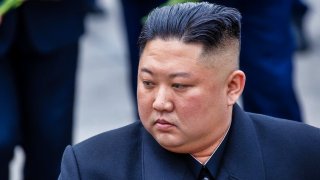Kamala Harris Can Put North Korea Policy on the Right Path
With a new focus on mitigating North Korea's further adventures in nuclear weapons and missile technology—the hydrogen bomb, miniaturization, Intercontinental Ballistic Missile (ICBM) re-entry and guidance technologies—in exchange for an “end of war” declaration and allowing Western economic engagement. Washington has nothing to lose apart from its incomprehension.
To achieve any goal, it is essential to know both where you are and where you are going; to know the question before the answer. The problem with the Biden Administration’s North Korea policy is they have redundant answers to long-dead questions.
Kim Il Sung made a strategic pivot with the collapse of the Soviet Union and its Empire in the early nineties and chose to attempt to both develop a unilateral security apparatus independent of Beijing and Moscow and normalize relations with Washington. This twin-track policy was consistently followed by his son and grandson.
This policy had its final hurrah at the 2019 Hanoi Summit. There is no need for forensic analysis to conclude any potential deal was murdered in Vietnam, as Kim felt totally humiliated by the experience. The pro-engagement camp in the International Department of the Workers’ Party of Korea and the Ministry of Foreign Affairs were consequently routed.
It was Trump’s unprecedented engagement that, for Kim, made its failure final. For Pyongyang, the subversion and sabotage of the President's policy by his subalterns and subordinates convinced Kim there was no path to any deal he could live with. All subsequently reinforced by the U.S. “defeat” in Afghanistan, the dithering over Ukraine, and the failure of leadership in Gaza.
There was now an alternative, with the U.S. no longer being the sole world hegemon on stage. Kim chose to put the country on a war footing—with all the dangers of accidental war that entails—and maintain links with Beijing and rebuild them with Moscow and Tehran. Pyongyang has bet that bloc politics—that many thought had died with the Soviet Union—is back. Kim’s philosophy was highlighted in his 2019 New Year Address, as important as Khrushchev's 1956 secret speech, as it abandons the State's founding myth of re-unification.
Pyongyang’s nuclear program is a demonstration of weakness, not strength. They are David, not Goliath. The reality is the North is comprehensively out-spent, out-gunned, and out-resourced by Seoul, whose military budget far surpasses that of Pyongyang by a factor of eleven. Encompassed by its rivals: the U.S., Japan, and South Korea, saying that North Korea is insecure regarding its statehood is an understatement. The hard reality is the nuclear option is, and shall remain, the ultimate trump card that Kim can rely on at any time.
The North’s two key restraints on growth are energy and manpower. The nuclear option answers both questions. Civil nuclear power, and a standing army of close to 1.4 million that could free more than 100,000 men just by cutting conscription by a year. Kim continues to produce, refine, and deploy his nuclear arsenal and platforms. The reference in his New Year Address to a new ’super powerful’ weapon can only allude to the North Korean hydrogen bomb project, one that they were successful in testing… according to them at least.
What should a potential President Harris do on North Korea and why?
First, recognize that nuclear disarmament and Complete, Verifiable, and Irreversible Denuclearization (CVID) is dead and that it serves U.S. strategic interests to weaken the new East Asian Cold War alliance by attempting to peel away Pyongyang.
Second, ignore those close to the U.S. Administration talking about pre-emptive attacks, while restraining President Yoon’s military adventurism. This can only lead to playing a deadly game of leapfrog as the two race each other to war. Sanctions from the United Nations serve no purpose when levied at a country that self-isolates, for four years and now receives support from the international pariah: Russia.
Pyongyang is, without doubt, a growing threat to both its neighbors and the U.S. The way forward is a de facto recognition of Pyongyang as a nuclear weapons state, like India, Pakistan, and Israel. With a new focus on mitigating the North's further adventures in nuclear weapons and missile technology—the hydrogen bomb, miniaturization, Intercontinental Ballistic Missile (ICBM) re-entry and guidance technologies—in exchange for an “end of war” declaration and allowing Western economic engagement. Washington has nothing to lose apart from its incomprehension.
About the Author
Glyn Ford was a Former Member of the European Parliament and author of Talking to North Korea (2018) and Picturing the DPRK (2024).
Image Credit: Creative Commons and/or Shutterstock.


